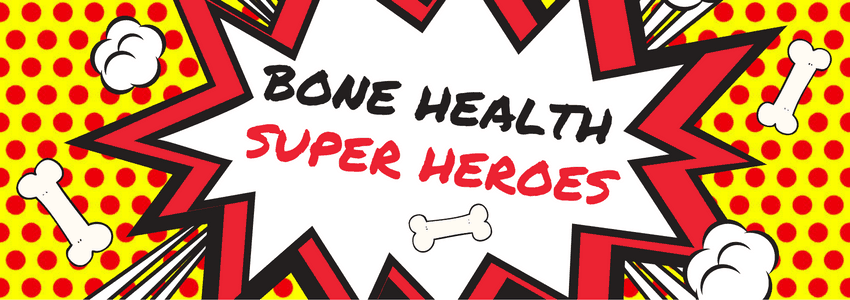Your bones are alive. Osteoblasts are constantly making new bone while osteoclasts destroy it. This process is called bone remodeling. For your bones to keep this process in balance they require the adequate bone health minerals.
That is why we asked these popular experts and Bone Health Superheroes to choose their top 2 minerals they recommend for bone health. While there is a matrix of minerals that contribute to positive bone-building, we wanted to give you two to focus on.
In the explanations below from our experts, you will read minerals you probably know about, as well as minerals you might not have thought contributed to bone health. Read on to find out what they are:
Lauren Slayton, MS, RD 
My much-loved minerals would have to be magnesium and zinc. Each of these are crucial for bone health but are really “minerals of all trades” with so many functions we rely on.
Magnesium and Vitamin D are interrelated. We need magnesium for D to work but when D intake is too high (as is the case when people megadose) you run the risk of being magnesium deficient.
When you workout, rethink those cramps. They may be magnesium-related versus merely a matter hydration. Remember, magnesium helps pull calcium from the bloodstream to bones. In terms of fantastic food sources think seeds (pumpkin, sesame, and sunflower) and spinach. Aside from bones, when magnesium is low blood sugar control is affected, indirectly magnesium plays a role in weight control too.

Zinc, I don’t know that many people think of zinc when thinking about bone health. Zinc decreases the activity of osteoclasts that contribute to bone loss and stimulates osteoclasts that build bone. Smokers and even ex-smokers are especially at risk of zinc deficiency. A toxin from smoking displaces zinc from bone.
Women need at least 50 mg zinc, for men it’s double. Grass-fed beef and seafood (shrimp and scallops) are great sources. In addition to bone health, zinc is important for fertility, immunity and acne prevention.
To Meet Lauren Slayton, Please Visit http://foodtrainers.com/, @Foodtrainers, Foodtrainers
Vicki Shanta Retelny, RDN, LDN
Optimal bone health is contingent upon getting the right mix of nutrients and physical activity. In order to keep your bones in tip-top shape, your lifestyle is vital. Our bones are a living tissue that is always being regenerated, thus a steady stream of essential vitamins and minerals are important to creating a dense bone matrix for life.
Calcium and phosphorus are two key minerals essential for healthy bones. Bones are living, changing organs; they go through a process called “remodeling,” which means that hormones and vitamins (mainly vitamin D) regularly signal a turnover of the old bone to be replaced with the new bone tissue throughout your life. This allows for the normal growth and to repair any damaged bone due to stress from sports and regular high-impact activity like running. However, the primary reason the bones remodel is to keep calcium in balance.
 As a registered dietitian nutritionist, I recommend that people eat a variety of nutrient-rich whole foods to support bone – and overall health. If you can tolerate dairy products, then cow’s milk, yogurt and cheese are good for a significant amount of calcium and phosphorus. I often recommend the plant-based route to minerals as you get vital phytonutrients, which can keep your cells healthy, too. Some of the best plant sources of calcium are leafy greens like kale, spinach, Swiss chard, and collard greens, as well as beans and legumes.
As a registered dietitian nutritionist, I recommend that people eat a variety of nutrient-rich whole foods to support bone – and overall health. If you can tolerate dairy products, then cow’s milk, yogurt and cheese are good for a significant amount of calcium and phosphorus. I often recommend the plant-based route to minerals as you get vital phytonutrients, which can keep your cells healthy, too. Some of the best plant sources of calcium are leafy greens like kale, spinach, Swiss chard, and collard greens, as well as beans and legumes.
Also, calcium-fortified nut and rice milks, as well as fish with bones (i.e., sardines, salmon steak) and tofu (made with calcium sulfate) will give you a good dose of calcium, too. The average adult needs 1,000 milligrams of calcium; children need a bit more, 1,200 mg, as their bones are growing quickly.
To Meet Vicki Shanta Retelny, Please Visit http://www.simplecravingsrealfood.com, @vsrnutrition, victoria.retelny
Karman Meyer, RDN, LDN
It’s best to obtain the minerals your body needs through food sources, but in some cases, a supplement may be necessary. To keep bones strong for years to come, make sure your diet is rich in these two macro-minerals.
Magnesium:
While calcium and vitamin D are often given all the glory in bone health, magnesium is the “behind the scenes” mineral that is essential for bone health. Magnesium makes up two-thirds of our bone structure and converts vitamin D into its active form, which helps absorb calcium. Deficiencies of this magnificent mineral can result in low vitamin D levels and poor bone structure, as well as leg cramps and muscle twitching.
Green leafy vegetables, beans, nuts, and whole grains are the best options for getting adequate amounts of magnesium in your diet. The average person should consume between 300-400 milligrams of magnesium per day. To put that into perspective, 2 cups of cooked spinach or 2.5 cups of cooked quinoa would provide your daily dose of magnesium.
Calcium:
This well-known mineral certainly is important in keeping the skeletal system sturdy. Calcium is one of the building blocks of bones and is also essential for maintaining bone strength as we age. More than 99% of the total calcium in our bodies is stored in our bones.

It’s best to spread out your calcium-rich foods throughout the day rather than getting a full dose all at once. The calcium recommendation is highest for kids ages 9-18 at 1,300 milligrams to maximize bone growth and calcium storage. For both men and women age 19-50 years old, 1,000 milligrams is recommended per day. This value remains the same for men age 51-70. Women between the ages of 51-71 should aim for 1,200 milligrams each day. As previously mentioned, you must also obtain adequate amounts of magnesium as well to keep bones strong.
Most people are aware that dairy products contain calcium, but there are also great non-dairy sources such as tofu, sardines, bok choy, collard greens, broccoli, kale, fortified orange juice, and fortified non- dairy beverages.
To Meet Karman Meyer, Please Visit http://www.karmannutrition.com/, @KarmanRD
Stephanie Pedersen, MS, CHHC
When I talk to people about bone health, often it’s the less known nutrients–the ones that many Americans don’t get enough of–that I emphasize.
Many of my clients are women who are in their 40s through 70s–meaning if they aren’t post-menopausal, they are very likely entering peri-menopause. Women in this group should take special precautions to keep their bones strong, with weight-bearing exercise, plant-based sources of calcium, and other nutrients that encourage bone density. One of these is zinc, a mineral thought to increase bone formation by encouraging the growth of bone cells. The RDI for zinc is 11 mg for non-pregnant adults.

Because your body has no natural way to store zinc, it’s important to make sure you’re getting your daily dose. It’s found in meat, poultry, nuts and shellfish, such as oysters, lobster and crab.
Potassium is another important mineral that helps maintain bone integrity by neutralizing the bone-eating acids your body makes during metabolic processes. The RDI is 4,700 mg a day; the average American woman gets 2,200 mg and the average man gets 3,200 mg. Bananas, avocados, beans, potatoes, coconut water and oranges are great sources of potassium.
Linda Heredia, BHSc, RHN, CCP
Our bones play so many key roles in the body. They provide us with mobility, protect our organs, store minerals, and anchor our muscles. With everything they do for us, it is important throughout all stages of life to provide our body with the nutrients it needs for strong and healthy bones!
Two essential minerals to support bone health (and two that you are likely familiar with!) are calcium and magnesium.
Calcium:
This mineral provides us with the foundation for strong and healthy bones. Calcium supports bone mineralization during our growth and development in our early years and it slows down bone loss in our later years. In addition to supplementing with calcium, you can find great sources of this bone-supportive mineral in foods, such as broccoli, kale, bok choy, sesame seeds, sardines and raw almonds. The issue that we see with calcium is its absorption. As we age, our body has a more difficult time absorbing calcium into the bones. This is where magnesium helps!
Magnesium:
This mineral supports calcium metabolism and bone formation making it a perfect complement to calcium. Research also shows that magnesium may be supportive in reducing bone loss as we age and decreasing our risk of osteoporosis. Foods rich in magnesium include spinach, lentils, raw almonds, broccoli, pumpkin seeds and sunflower seeds. It can be difficult to get high amounts of magnesium through food alone, so I do recommend adding in magnesium in a supplement form to ensure your body is getting the right balance it needs for healthy, strong bones. This mineral supports calcium metabolism and bone formation making it a perfect complement to calcium.
 Research also shows that magnesium may be supportive in reducing bone loss as we age and decreasing our risk of osteoporosis. Foods rich in magnesium include spinach, lentils, raw almonds, broccoli, pumpkin seeds and sunflower seeds. It can be difficult to get high amounts of magnesium through food alone, so I do recommend adding in magnesium in a supplement form to ensure your body is getting the right balance it needs for healthy, strong bones.
Research also shows that magnesium may be supportive in reducing bone loss as we age and decreasing our risk of osteoporosis. Foods rich in magnesium include spinach, lentils, raw almonds, broccoli, pumpkin seeds and sunflower seeds. It can be difficult to get high amounts of magnesium through food alone, so I do recommend adding in magnesium in a supplement form to ensure your body is getting the right balance it needs for healthy, strong bones.
A diet rich in these foods paired with a high-quality supplement will ensure your body is getting two of the key nutrients needed to promote strong bone health!
To Meet Linda Heredia, Please Visit https://www.lindaheredia.com/, @Linda__Heredia, lindaherediahealth





Article Comments